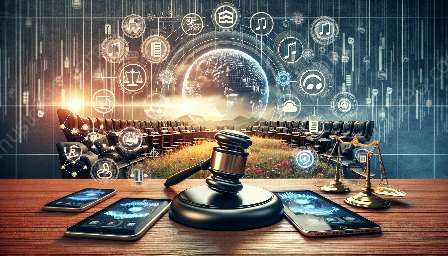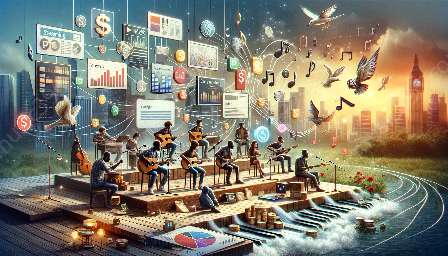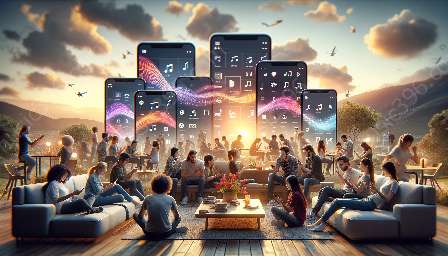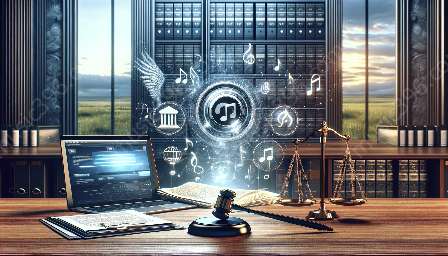Music education is a fundamental aspect of cultural and artistic development, providing individuals with the opportunity to explore their creativity, expression, and passion for music. However, the accessibility of music education has been significantly impacted by the rise of piracy in music streams and downloads. This topic cluster aims to shed light on the intersection of music education, piracy, and technology, and explore the evolving landscape of learning music through digital platforms.
1. The Importance of Music Education
Music education encompasses a broad range of activities and experiences, including formal instruction, performance, composition, and music appreciation. It plays a crucial role in fostering creativity, cognitive development, and emotional expression in individuals of all ages. By providing access to music education, society can empower future generations to appreciate and engage with diverse musical traditions, enhancing cultural understanding and social cohesion.
1.1. The Benefits of Music Education
Music education offers numerous benefits, including:
- Enhanced cognitive development and academic performance
- Improved emotional well-being and stress reduction
- Increased cultural awareness and empathy
- Development of collaborative and interpersonal skills
- Fostering a lifelong appreciation for music and the arts
2. Accessibility of Music Education in the Digital Age
The digital revolution has transformed the way music education is accessed and distributed. Online platforms and learning resources have made music education more accessible to individuals around the world, breaking down geographical barriers and opening up opportunities for remote learning. However, the proliferation of piracy in music streams and downloads has posed significant challenges to the sustainability of music education programs and resources.
2.1. The Impact of Piracy on Music Education
Piracy in music streams and downloads has led to:
- Diminished financial support for music education institutions and programs
- Decreased revenue for musicians, composers, and music educators
- Limited access to high-quality educational materials and resources
- Undermined incentives for the creation and distribution of original music content
- Threatened the preservation of cultural and musical traditions
2.2. Addressing Accessibility Challenges in Music Education
To enhance the accessibility of music education in the digital age, stakeholders can:
- Collaborate with technology companies to develop secure and user-friendly platforms for music education
- Advocate for fair compensation and copyright protection for music creators and educators
- Offer scholarships, grants, and financial aid to support aspiring musicians and music students
- Integrate music education into broader educational curricula and community programs
- Embrace innovative teaching methods and digital tools to engage diverse learners
3. The Influence of Music Streams and Downloads on Learning
Music streams and downloads have revolutionized the way individuals discover, consume, and engage with music. While these digital platforms offer unparalleled access to a vast library of musical content, they also shape the way individuals learn about and experience music. Understanding the influence of music streams and downloads on learning is essential for educators, musicians, and students alike.
3.1. The Educational Potential of Music Streaming Platforms
Music streaming platforms hold significant educational potential, including:
- Exposure to diverse musical genres, styles, and traditions
- Access to curated playlists, music history, and artist biographies
- Opportunities for independent discovery and exploration of music
- Integration of music streaming into academic coursework and research
- Collaborative sharing and discussion of music among peers and educators
3.2. Mitigating the Impact of Piracy on Music Learning
To mitigate the impact of piracy on music learning facilitated through streams and downloads, educators and industry stakeholders can:
- Teach ethical and legal considerations related to music consumption and distribution
- Advocate for policies that support fair compensation for artists and music educators
- Promote the use of licensed, legitimate streaming platforms in educational settings
- Encourage critical thinking and analysis of music quality and authenticity
- Create opportunities for students to engage directly with artists and music creators
4. Leveraging Technology for Inclusive Music Education
Technology has the power to democratize access to music education and create more inclusive learning environments for aspiring musicians and music enthusiasts. From virtual music lessons to interactive music production software, technological innovations can enhance the accessibility, quality, and diversity of music education experiences.
4.1. Tools and Resources for Inclusive Music Education
Key technological tools and resources include:
- Virtual music instruments and ensembles for remote collaboration
- Adaptive learning platforms for personalized music instruction
- Accessible notation software and music theory apps for diverse learners
- Online forums and communities for sharing musical knowledge and resources
- Real-time feedback and assessment tools for musical performance and composition
4.2. Empowering All Learners Through Technology
By leveraging technology, music educators can empower:
- Students with disabilities to access and participate in music programs
- Learners from under-resourced communities to engage with high-quality music resources
- Adult learners and working professionals to pursue lifelong music education opportunities
- Global communities to celebrate and preserve diverse musical traditions and heritage
- Innovative collaborations between artists, educators, and technology developers
5. Embracing Collaboration and Advocacy
Collaborative efforts and advocacy play a crucial role in addressing the challenges and opportunities at the intersection of music education, piracy in music streams and downloads, and the impact of digital platforms on learning. By working together, educators, musicians, industry leaders, and policymakers can shape a more equitable and sustainable future for music education and the broader music industry.
5.1. Collaborative Initiatives in Music Education
Key collaborative initiatives include:
- Partnerships between educational institutions and music industry stakeholders
- Advocacy campaigns for music education funding and accessibility
- Creative collaborations between musicians and educators to develop educational content
- Research alliances to understand the impact of technology on music learning
- Community-based projects to promote music education in diverse cultural contexts
5.2. Advocacy for Ethical and Legal Music Consumption
Advocates can work to:
- Influence policy decisions related to copyright, fair use, and digital rights management
- Educate the public about the consequences of music piracy on artists and creators
- Promote the value of ethical and legal music consumption in educational settings
- Foster a culture of respect and appreciation for the creative work of musicians and composers
- Champion fair compensation and recognition for music educators and industry professionals
Conclusion
The accessibility of music education is intricately linked to the evolving landscape of music streams and downloads, as well as the ethical and legal considerations surrounding piracy. By understanding the influence of digital platforms on music learning and embracing collaborative efforts, educators and industry stakeholders can ensure that music education remains inclusive, diverse, and sustainable for generations to come.


























